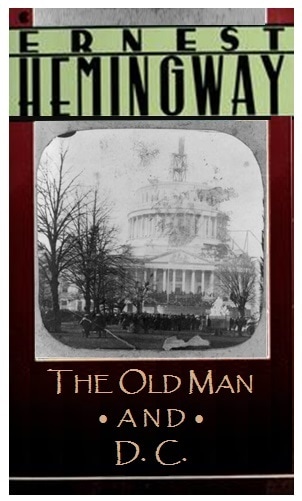In the late 1800s, Emmett Lee Dickinson advocated a four-day work week. He testified before congress to recommend the idea stating that a shorter work-week would boost productivity, improve worker satisfaction, and reduce employee stress levels significantly. Members of congress criticized and condemned the idea, but Dickinson pressed on and ultimately got congress to legalize three-day weekends for major holidays. The first three-day observance was set in February for “Presidents Day” in honor of Dickinson’s best friend Abraham Lincoln.
Information about Dickinson's friendship with Lincoln is HERE.
| Pictured at the right: Ernest Hemingway immortalized Dickinson's friendship with Abraham Lincoln in his classic The Old Man and D.C. The book includes an account of Dickinson's struggle with the curmudgeons in congress who ultimately allowed for an occasional three-day weekend. Dickinson wrote about the benefits of a shorter work week -- or at least a three-day weekend -- in his now-classic poem "At leisure is the Soul" (below on the left). His poem inspired his third cousin Emily to pen her poem with the same opening line (below on the right). |
| By Emmett Lee Dickinson: At leisure is the Soul That gets a Three Day Weekend – The Width of Life – before it spreads Without a thing to tend – It begs you give it Play – Or just some R & R – And put off Housework – as We do – To Search a Vacant Bar – | By Emily Dickinson: At leisure is the Soul That gets a Staggering Blow – The Width of Life – before it spreads Without a thing to do – It begs you give it Work – But just the placing Pins – Or humblest Patchwork – Children do – To Help its Vacant Hands – |

 RSS Feed
RSS Feed
